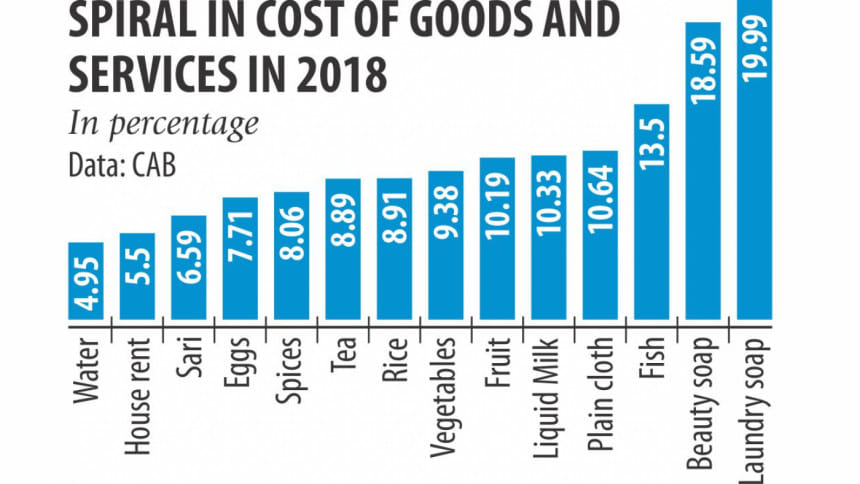Living in Dhaka: People spent 9pc more on rice

The price of rice rose by around nine percent in the capital in 2018 compared to a year ago, while the cost of living increased by six percent, the lowest in nine years, said the Consumers Association of Bangladesh yesterday.
Prices of other essentials -- vegetables and house rent -- went up by 9.38 percent and 5.5 percent. However, cost of a number of essentials such as pulse, garlic, sugar and salt declined compared to that of 2017.
CAB President Ghulam Rahman revealed the findings at a press conference unveiling CAB's annual report on cost of living in Dhaka at the Dhaka Reporters Unity.
CAB, a voluntary organisation, prepared the report based on the price data of 114 food items and 22 daily commodities from 15 city markets. It also took into account prices of 14 different services. However, the cost of education, healthcare and actual transport were not included in the estimates, Ghulam said.
“Most of the country's people belong to poor, low-income and lower-middle income groups.
Hike in price of essential goods affect their lives. It creates a gap between the rich and poor,” he said.
The price of different varieties of rice, which is a staple, soared to 8.91 percent higher in 2018 than the previous year.
For instance, prices of fine variety of rice, miniket, rose 5.67 percent year on year reaching Tk 62.25 per kg in 2018 from Tk 58.91 the previous year. Prices of nazir shail, another fine variety, shot up 13.17 percent to Tk 71.94 per kg last year from Tk 63.57 the previous year, according to CAB data.
On the other hand, the price of coarse rice fell by 15 percent in December 2018 compared to its price in the same month of last year.
The price rose due to re-imposition of 28 percent import duty on rice in June last year, said the CAB.
Increase in rice production resulted in prices reaching satisfactory levels towards the end 2018, it added.
Apart from rice, consumers in the city also had to pay more to buy fish, vegetables, eggs, spices, liquid milk, meat as well as various essential non-food items including soap, sari, house rent and water.
Average prices of laundry soap rose by 20 percent irrespective of brands while cost of beauty soaps rose by 18.59 percent last year, according to the CAB.
Additionally, due to high import duty, consumers had to pay $14,223 million or about Tk 1.14 lakh crore more in fiscal 2017-18, the report mentioned. The average import duty in Bangladesh was 25.64 percent in 2017, which was much higher than in other South and Southeast Asian countries.
Significant reduction of import duty would be a logical step to encourage industrialisation, increase in employment and provide products to consumers at reasonable prices, it said.
LOWEST COST RISE IN NINE YEARS
The cost of living for more than 1.7 crore dwellers in the city rose by six percent last year, which is 45 basis points higher than the annual average inflation of 5.55 percent at a national level.
This was the lowest spike in the cost of living in nine years since the year 2009 when living cost rose 6.19 percent.
In 2017, the rise was 8.44 percent, according to CAB data.
Talking to the The Daily Star over phone, Rahman said CAB estimated the spike in living costs based on increase of expenditure on the same amount of essential commodities and services of a family between two years.
At the press conference during the unveiling of the report, he said Bangladesh had made significant progress on different development indicators. However, there was no alternative to keep living cost at bearable stage so everybody could enjoy the fruits of development.
According to the CAB report, the price of most essential goods remained largely “stable” in 2018 with a downward trend of price of rice and some other goods towards the year end.
Last year, prices of gas, electricity and energy fuel, as well as government-fixed bus and train fares, remained unchanged while prices of edible oil and power milk were largely stable, it said.
In the report, CAB also emphasised implementing existing laws and regulations for upholding consumer rights.
It further praised app-based ridesharing services in the capital and stressed the need for bringing those under a legal framework to protect consumer rights.
It also made a number of recommendations to the government, including establishing a consumer affairs ministry and procuring rice directly from the farmers to make people's living cost bearable.
Responding to a query, Ghulam, a former Anti-Corruption Commission chairman, said although the report was based on the capital city, it also reflected people's living condition in other parts of the country.
“People's income has increased over the years. However, such increase was not equal for all. Those who did not have a six percent income increase had to face hardship in their daily living due to a rise in living costs,” he said.
A rise in income was essential for improving living conditions while rise in costs also had to be satisfactory, he said.
Ghulam also said price hike of different goods was unacceptable and the government should closely monitor the market to stop such hikes and take effective measures against unscrupulous people and rackets.
The CAB report also mentioned the service-seeking consumers in banks had to count losses due to reduction of interest rate against deposits, hike of interest against bank loans, and imposition and increase of different service-charges.
The amount of default loans rose to about Tk 1,00,000 crore in the country due to corruption in the process, unwillingness of a section of borrowers to return loans and legal limitation in loan recovery which put depositors and small-scale borrowers at risk of counting financial losses, the report said.

 For all latest news, follow The Daily Star's Google News channel.
For all latest news, follow The Daily Star's Google News channel. 




Comments